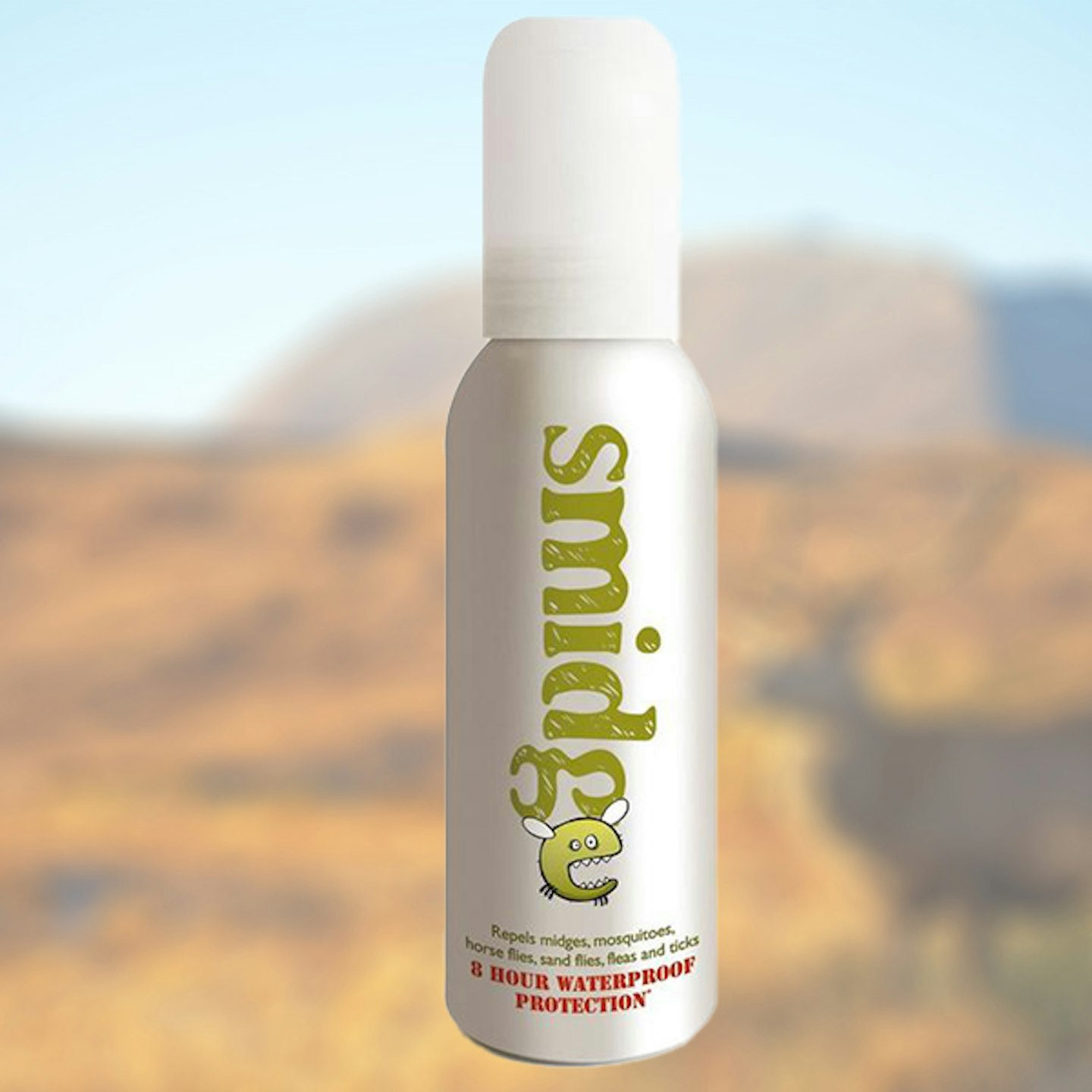Sleeping under a camping tarp is a magical and minimalist experience. Unlike a tent, which cocoons you from the environment behind twin layers of the inner and flysheet, a tarp leaves you gloriously open to the landscape. The golden dusk light is unfiltered, stars dazzle overhead and your views are unhindered – a more intimate way to sleep wild.
It’s a must-do for those looking to get closer to nature and the mountains, but it's not the easiest activity to wing your first time. If you're just getting into the idea, check out our beginner's guide to tarping before you hit the hills this weekend.

What is a tarp? It’s a single-skin sheet of waterproof material used to create an outdoor shelter. It can be pitched in numerous layouts and shapes using pegs, walking poles, guy lines and optional groundsheets or bug nets.
This versatility allows a bespoke set-up tailored to the prevailing weather: pitch high for space and ventilation in fine conditions; pitch low for stability and protection on rainy, windy days. From the simple A-Frame and Lean-To to the more complex Tipi or C Fly Wedge, the options for tarp orientations are plentiful.
What are the best tarps of 2025?

Best in test: Nordisk Voss 5 LW
Best value: Alpkit Rig 3.5
Best for versatility: MSR Thru-Hiker 70
There are three main types of tarp: flat, shaped and tarp-tents. We've covered the full range in this article. Flat tarps are square or rectangular, and generally-speaking are the simplest and cheapest option on the market.
Shaped tarps are multi-sided or have curved edges, with different shapes (e.g. hexagonal) optimised to a specific orientation. Tarp-tents – which blur the line between tarp and tent – can be pitched in different ways but include advanced features such as integrated bug nets, zippers and doors.
Whether you’re a long-term tarp aficionado or simply considering sleeping in a tarp for the first time, take a look at our picks and find the one that's just right for you.
How we tested the best tarps
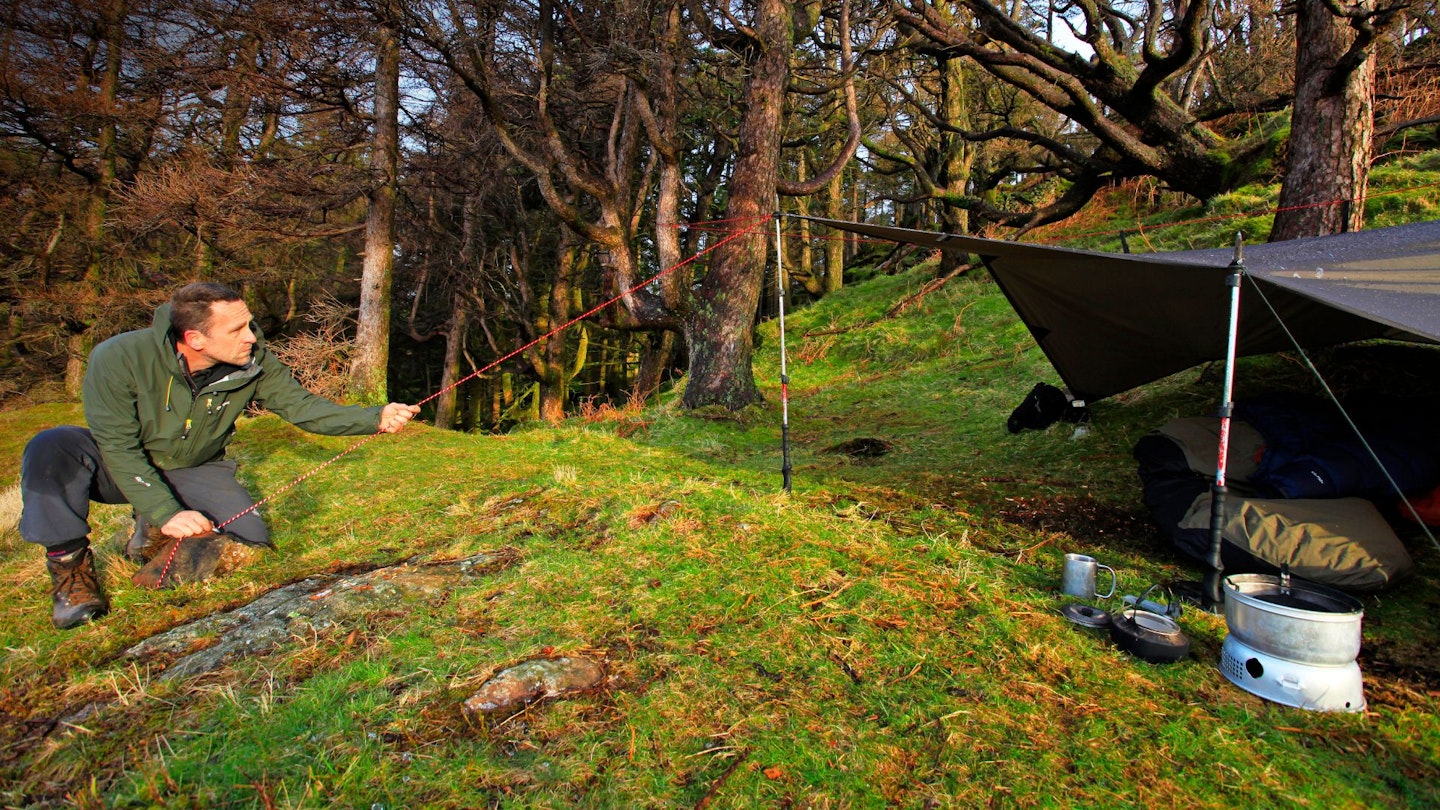
As tarps are a very minimalist camping shelter, they get tested by those on our team who really enjoy that type of open-air camping. These team members include our photographer Tom Bailey, our lightweight backpacking specialist James Forrest, and on occasion, our Gear Editor Ben Weeks and Senior Writer Chris Williams.
We tend to test tarps in summer when conditions are mild, taking them on some of our most remote backpacking trips when we want to get as back to basics as possible.
The best camping tarps reviewed:
Labelled confidently as ‘one of the world’s lightest portable shelters’, the Nordisk Voss 5 LW is an ultralight backpacker’s dream – a gram-saving solution for those whose number one priority is weight. It’s a minimalist, ultralight tarp weighing just 180g, or 240g with six removable guy lines and storage sack – although you have to pay a sky-high price for this low weight.
There are numerous attachment points, including four in the corners and four centred on each edge. Each of the tough, 2mm Dyneema guy ropes has a guy line slider and a mini aluminium hook, as well as a fabric loop into which pole tips slide. The 10-denier ripstop nylon (with silicon coating) has a 2,000mm hydrostatic head rating and the tarp’s size is 250 x 200cm, packing down to 20 x 15cm.
Pros
- Super lightweight
- Great functionality
- Innovative pole connection system
Cons
- Almost worryingly thin
- Doesn't come with pegs
| Weight: | 240g/8.47oz |
| Dimensions: | 250cm x 200cm |
| Packed size: | 20cm x 15cm |
| Material: | 10D nylon w/ silicone coating (2000mm HH) |
| Attachment points: | 8 |
| Extras: | 6 removable guy ropes, guy line sliders, aluminium hooks |
Perfect for beginners and budget-conscious campers, the Alpkit Rig 3.5 is an excellent, sensibly-priced tarp. Made from a 30-denier siliconised ripstop nylon, it weighs 300g and measures 240 x 140cm, including 16 reinforced Hypalon rig points – striking an excellent compromise between weight, size, features and performance.
Alpkit say the Rig 3.5 packs down to the “size of your hand” (14 x 10cm), so it won’t take up too much space in your backpack. The 30-denier, PU-coated silicon Cordura fabric is fully taped on the underside to prevent water ingress, while the siliconised coating on the top side reduces water build up. For more space, the Rig 7 is sized 280 x 240cm and suitable for two people.
Pros
- Highly protective
- Packs very small
- Unbeatable price
Cons
- High demand often means it's out of stock
- Only large enough for one person
| Weight: | 300g/10.58oz |
| Dimensions: | 240cm x 140cm |
| Packed size: | 14cm x 10cm |
| Material: | 30D PU-coated Cordura |
| Attachment points: | 16 |
| Extras: | Stuff sack included |
This simple rectangular tarp (289 x 244cm) weighs 460g, including six ultralight pegs and six guy lines. Spacious for one but big enough for two, you get several attachment points and a 1,200mm-rated, 20-denier ripstop nylon with an Xtreme Shield PU coating, which sheds water superbly.
Pole tips fit securely into metal eyelets at each end, with the tension adjustable via guy lines; four sturdily-reinforced corners peg out using locking tensioner guys; and two further attachment points are available along each side. This ensures poles are stable and the tarp’s structure is taut. You can pair the Thru-Hiker 70 Wing with an optional mesh inner, if desired.
Pros
- Adjustable tension
- Sturdy construction
- Can be attached to pegs or trees
Cons
- Not as many attachment points as others
| Weight: | 460g/1lb |
| Dimensions: | 289cm x 244cm |
| Packed size: | 23cm x 10cm |
| Coating: | 20D nylon w/ PU and silicone coating (1200mm HH) |
| Attachment points: | 10 |
| Extras: | Ultralight pegs, six guylines, compatible with Thru-Hiker mesh house |
Using the same high-performing flysheet fabric found in its Laser Compact tents, this Terra Nova rectangular tarp provides a “lightweight reliable shelter”, capable of being pitched in “a variety of configurations” to protect you from the elements. You get reinforced eyelets and webbing tapes for a “flexible set-up”.
The Competition Tarp 1 is sized 245 x 148cm and weighs 290g, while a larger version measures 290 x 248cm and weighs 550g. Both are made from Terra Nova’s 20-denier ripstop polyester, with Watershed Si2 – a silicone/silicone-coating designed to ensure a fabric is “as light and as strong as possible”. This has a 3,000mm hydrostatic head waterproof rating.
Pros
- Has several configurations
- Extra security at attachment points
- Lightweight
- Higher waterproof rating than most rivals
Cons
- Strictly a one-person tarp (there is a two-person version, though)
| Weight: | 290g/10.23oz |
| Dimensions: | 245cm x 148cm |
| Packed size: | 13cm x 10cm |
| Material: | 20D polyester w/ silicone coating (3000mm HH) |
| Attachment points: | 8 |
| Extras: | None |
The award-winning TrailStar has a cult UK following, with fans praising its weatherproofing and amazing wind resistance. The shaped, five-sided tarp weighs 428g (in the 20-denier Pro SilNylon version) and has a 6m2 capacity suitable for two people easily and their gear.
Mountain Laurel Designs (MLD) – a small manufacturer based in Virginia in the USA – describes the TrailStar as combining “the high performance of a traditional pyramid shelter with the open multi-function pitching options of a tarp”.
It has five equal low-angle sides, no doors, and no zippers, flaps or vents to wear out or fail, thus increasing all-round reliability. Pitching options are plentiful. A wedge shape – which blocks wind from one or more directions – can be created by staking one or two sides tight to the ground and setting the others higher.
For stronger winds, all 10 stakes points can be used to form “an incredibly stable, low, wind shedding, bombproof shelter...able to handle 60 mph winds”, as MLD claim. Seam sealing is available as an additional service.
Pros
- Fantastic weather resistance
- Very spacious
- Durable construction
Cons
- Lacks ventilation
| Weight: | 428g/15.09oz |
| Dimensions: | Long panel edges 221cm (6m2 area size) |
| Packed size: | Not stated |
| Material: | SilPoly (lighter Dyneema Composite Fabric version also available) |
| Attachment points: | 10 |
| Extras: | Guylines, stakes (for extra fee), inner and floor (for extra fee) |
In actual fact, being sustainable is just one aspect of the this tarp that we like. The Bali-based brand is a World Fair Trade Organisation member, and this tarp is both recycled and PFC-free.
At 250cm x 250cm, it creates a generously-sized shelter, whatever way you rig it, and the 20D nylon material is very durable and has a perfectly adequate waterproof rating of 1500mm HH. We also like that it comes with pegs and guy lines. It's ready to go.
Ticket to the Moon is a hammock specialist (see our review of the TTTM Mat Hammock here), and its tarps are designed to be used with them. What this means is that the Lightest Tarp, like the hammocks, needs a tree or post to rig, rather than trekking poles.
Pros
- Recycled, PFC-free, and Fair Trade
- Lightweight yet durable
- Excellent value
Cons
- Requires tree to rig (not a trekking pole)
- Not as compact packed away as other rivals
| Weight: | 470g/1lb 0.5oz |
| Dimensions: | 250cm x 250cm |
| Packed size: | 33.5cm x 13.5cm |
| Netting: | 20D recycled and PFC-free sil-nylon (1500mm HH) |
| Attachment points: | 4 |
| Extras: | x2 pegs, x4 guy lines, x2 ridgeline tie outs |
This seven-sided wing tarp is made from a tough 75-denier ripstop polyester with a 5,000mm hydrostatic head rating. For improved waterproof performance in poor conditions, the outside of this fabric is siliconised, the inside has a PU coating and all seams are sealed. Weighing 700g and sized 300 x 280 cm, the heptagon shape provides ample room for two and you also get numerous attachment points.
Robens describe it as a “robust, reliable and versatile” shelter than can be “used in numerous ways to provide protection”, with a quick and easy set-up and a unique shape. Packed down, the tarp condenses pretty small to 37 x 9cm.
Pros
- Versatile pitching
- High waterproof rating
- Comfortable for two, can cater for more
Cons
- Relatively hefty
| Weight: | 700g/1lb 8.69oz |
| Dimensions: | 300cm x 280cm |
| Packed size: | 37cm x 9cm |
| Material: | 75D polyester HydroTex HD RS (5000mm HH) |
| Attachment points: | 6 |
| Extras: | Stuff sack, guy lines |
This well-priced, two-person, shaped tarp weighs 640g and is sized 320 x 190cm. Made from a strong and durable 70-denier, PU-coated ripstop nylon with 1,000mm hydrostatic head, the tarp features in-built cords, waterproof taped seams, double-stitched construction, four aluminium ground stakes and six rig points.
The six-point anchor system requires a simple, no-knots-needed set-up, and you also get LineLoc tensioners and aluminium ridgeline hooks for flexible pitching options. Reflective cords aid night-time visibility too. ENO describe the ProFly Rain tarp as “our jack-of-all-trades for sound protection from the elements”, with a streamlined shape that’s “ideal for weathering sudden downpours”. Packed away, the tarp measures 20.5 x 11.5cm.
Pros
- Tough fabric
- All extras included
- In-built cords
Cons
- Not as many configurations as other choices
- Relatively low waterproof rating
| Weight | 640g/1lb 6.5oz |
| Dimensions | 320cm x 190cm |
| Packed size | 20.5cm x 11.5cm |
| Material | 70D nylon w/ PU coating (1000mm HH) |
| Attachment points | 6 |
| Extras | Stuff sack, guylines, tensioners |
Ok, we admit it – it’s not really a tarp in the true sense. But this superb ultralight tent is an example of a new breed of single-skin, trekking pole tents that have similar characteristics to a tarp – such as a low weight and minimalist style – yet provide the enclosed comfort and protection of a traditional tent.
The Zpacks Plex Solo is an iconic tent in the American ultralight thru-hiking scene - the kind of thing gram-counting adventurers will salivate over. Weighing less than 400g, this one-person tent is pitched with a single 132cm trekking pole, creating a spacious and liveable interior (132cm high, 230cm long and 97cm wide) plus a good-sized vestibule. It is made from a super-strong, waterproof Dyneema composite fabric and features a bathtub-style floor.
Pros
- Superb liveability
- Great tent-like comfort
- Ultralight
- High quality Dyneema materials
Cons
- Super high-tech materials skyrockets price
| Weight | 411g/14.49oz |
| Dimensions | 230cm x 97cm (centre)/71cm (ends) |
| Packed size | 28cm x 13cm |
| Material | PFC-free 25gsm bio-based Dyneema Composite Fabric (20,000mm HH) |
| Attachment points | 10 |
| Extras | Carry case included; pegs not included |
What to look for in a camping tarp
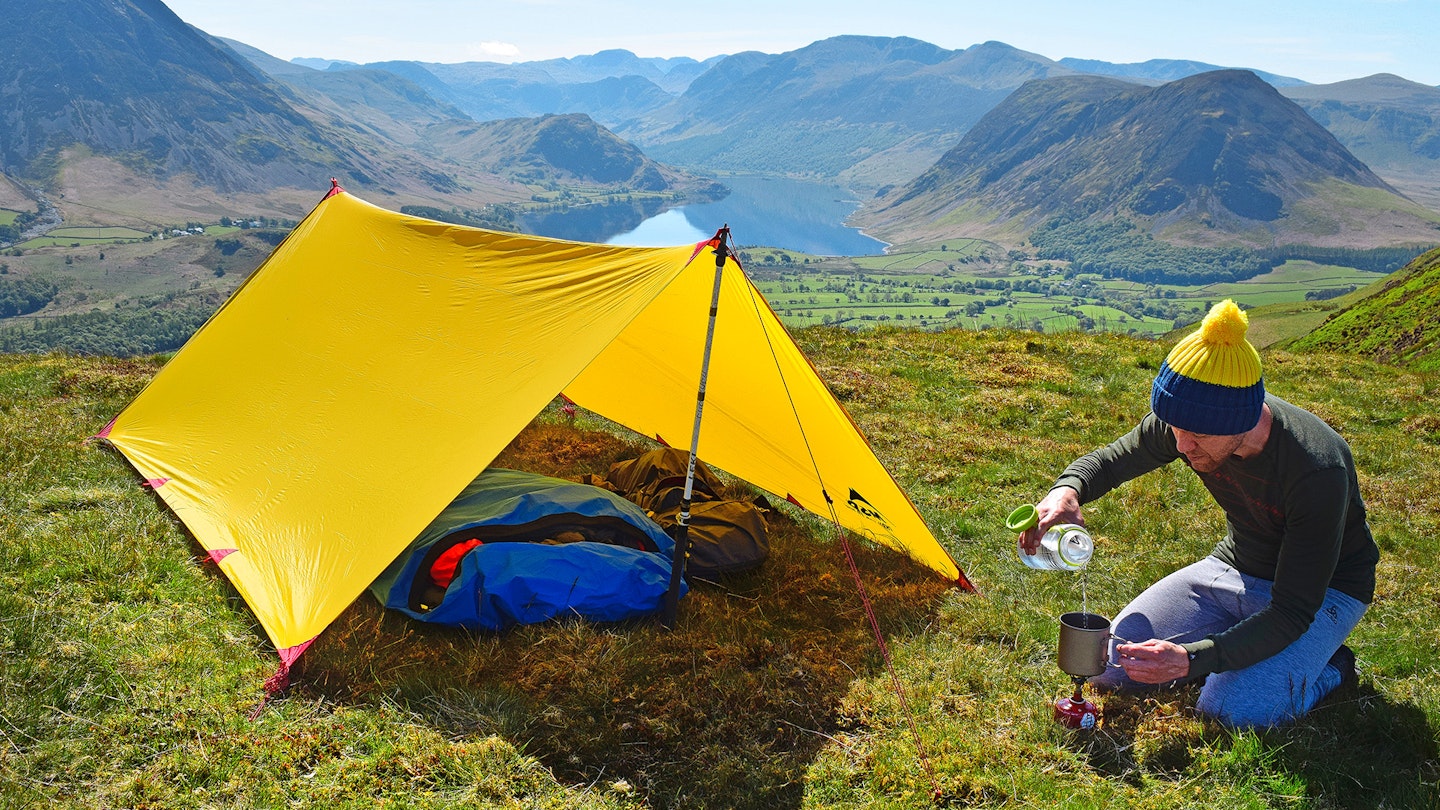
Weight
Ultralight gurus will opt for the lightest possible tarp, thus helping to reduce the overall weight of their backpack. Under 300g is feasible for a high quality tarp for one person. However, a heavier, thicker tarp may provide better waterproofing, extra coverage and improved versatility.
Waterproofing
Tarps are often made from advanced and highly-technical waterproof materials, such as Dyneema DCF, siliconised nylon (sil-nylon) or siliconised polyester (sil-poly). Waterproof coatings and treatments such as Polyurethane (PU) or silicone are commonly used too. Some tarp materials are thin and ultralight, which generally comes at a price premium. Others are thicker and cheaper, but heavier.
A tarp’s hydrostatic head rating will give a good indication of how waterproof it truly is – aim for 2,000mm or higher for adventures in wet climates. Another key consideration is the status of a tarp’s seams – some products come with pre-sealed seams to ensure the shelter is water-tight, while on some you will have to apply a sealant yourself to prevent water ingress.
Types
Each different tarp type has different pros and cons. Flat tarps are cheap, simple and great for beginners, with good versatility. They work particularly well in milder conditions or in forests where a ridgeline can be hung between trees.
Shaped tarps are best for a low-profile pitch, when you need to block out the horizontal rain in the mountains. Tarp-tents are best if you require a touch more luxury and better features, such as integrated zips, doors, groundsheets or bug mesh inners.
Can I use a tarp as a ground cover?
A larger tarp will be more versatile and capable of being pitched in a broader range of shapes and designs. A particular benefit of larger tarps is the ability to use part of the tarp as a groundsheet, thus protecting your sleeping bag from the wet ground (and potentially negating the need to carry an extra bivvy bag).
You should also have space to store your backpack and kit under the tarp. But remember that larger tarps will be heavier and bulkier.
How do I secure a tarp?
A good tarp will have several attachment points for guy lines and pegs, which attach to the ground or nearby objects ensuring greater versatility and stability when it comes to pitching. A good tarp should also have ‘prop points’, which are integrated grommets that house a trekking pole’s tip, thus helping to improve the stability of your tarp’s skeletal structure.
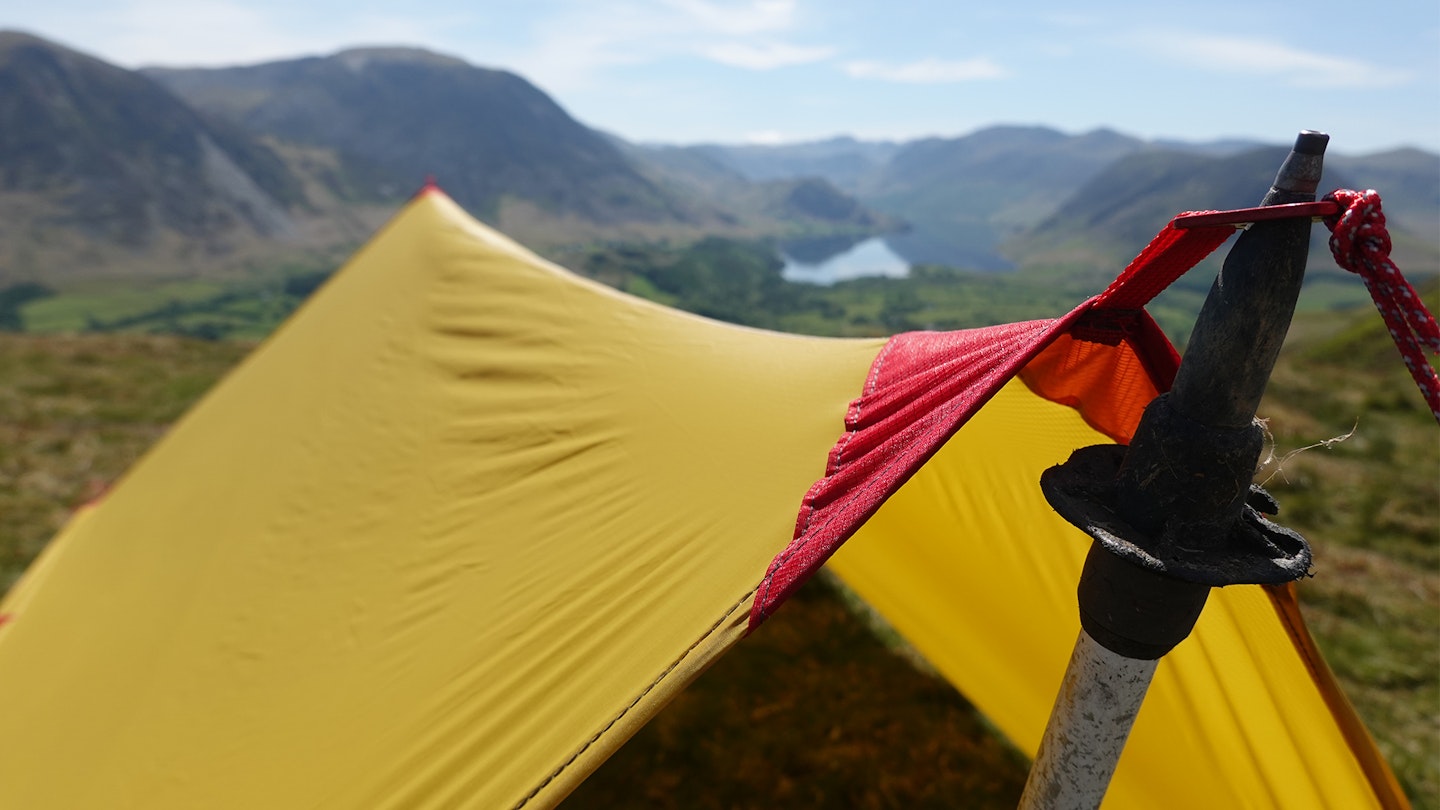
Are camping tarps worth it?
Our testers love their camping tarps. They're very lightweight, but help to protect you and your sleeping bag from the elements. Combined with a bivvy bag, a tarp can be handy for those summer nights where you're not sure whether the weather will hold. And you can always keep it in your backpack to use just in case.
You might be more open to the elements under a tarp, but this means that you can enjoy the view from the comfort of your sleeping bag. Of course, tarps aren't as weather-resistant as a high-quality tent, but this is the trade-off for a lighter weight.
It's best to use a camping tarp on warm nights, where you need a little more protection than just a bivvy, but a whole tent isn't needed.
Is a tarp better than a tent?
The main advantage of a tarp over a tent is that it's lighter and more compact, which makes it better-suited to ultralight backpacking. There's also improved airflow, so it's less likely for condensation to build up, and it's quick to dry. Tarps also tent to be more versatile: you can make them into a rain barrier, or enclose yourself inside them.
In some cases, though – high winds, heavy rain, cold, mosquitoes – you'd be better off using a tent, as they offer far better protection.
How big of a tarp do you need for camping?
The size of tarp depends on how many people you want to fit under. We found that the Robens Trail Wing had ample room for two, and it measures 300 x 280 cm. The Terra Nova Competition, on the other hand, is designed for strictly 1 person and is sized 245 x 148cm.
Bigger tarps probably provide better weather protection, as you're more likely to be able to enclose yourself inside them.
Looking to sleep out under the stars? Take a look at our full guide to wild camping.
Camping accessories to go with your tarp
Best insect repellent
This spray was developed and tested in Scotland – home of the heinous midge horde. Smidge is our top pick because it's both effective and inoffensive. Insect repellents can have a seriously harsh burn on the nose, eyes, and even on certain gear! Smidge's formula is moisturising, water-resistant, and doesn't produce any nasty stenches – at least not to humans. You'd best believe no bug wants to catch a whiff of this.
Best head net
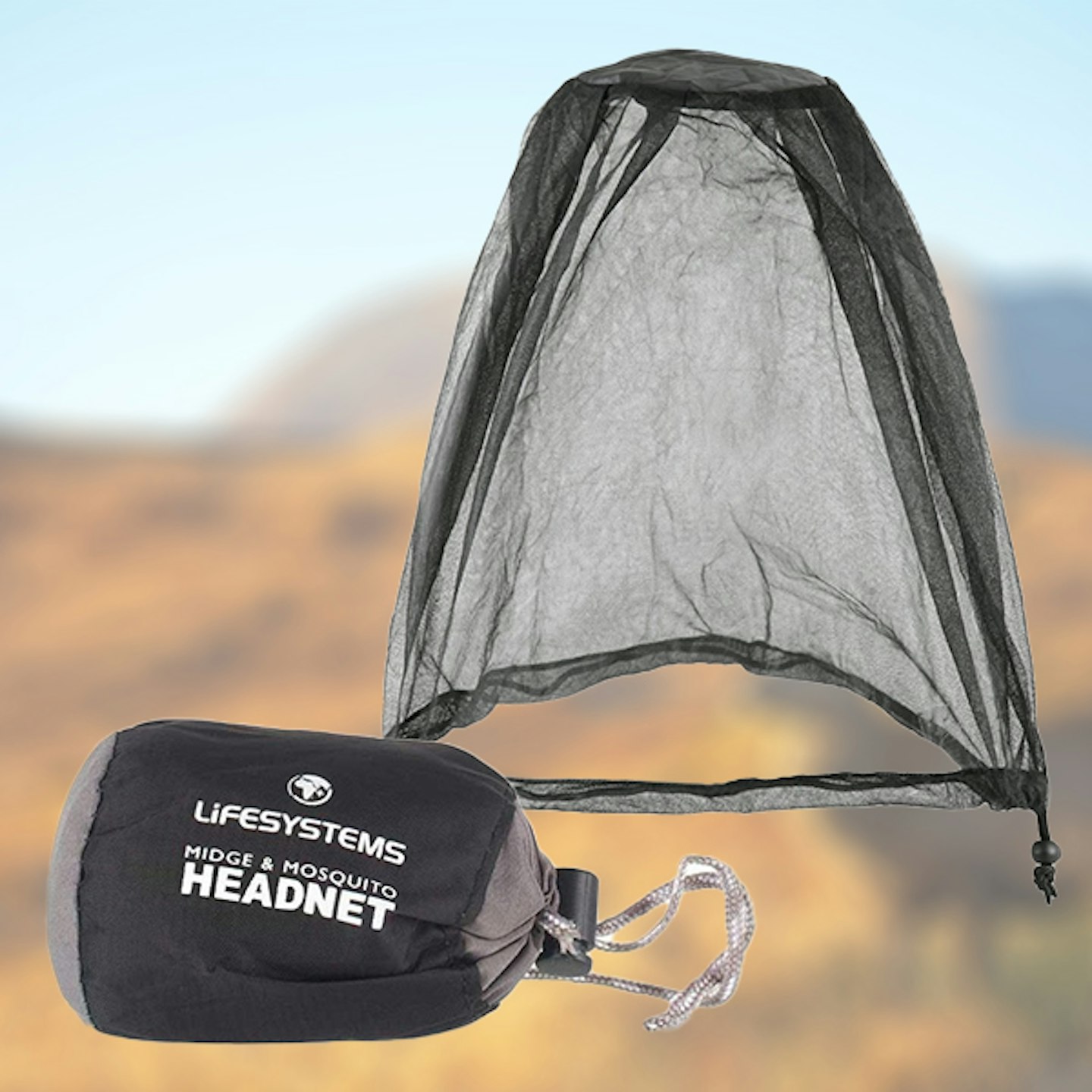
Whack this over your face and feel smug as you storm through cloud after cloud of midges and gnats. Lifesystems have developed a rugged and reliably bug-proof head net that can be worn solo or stretched over a hat if you want to look stylish. Tried and true, we can't recommend it more heartily. Just make sure you don't accidentally trap a few little critters in there with you!
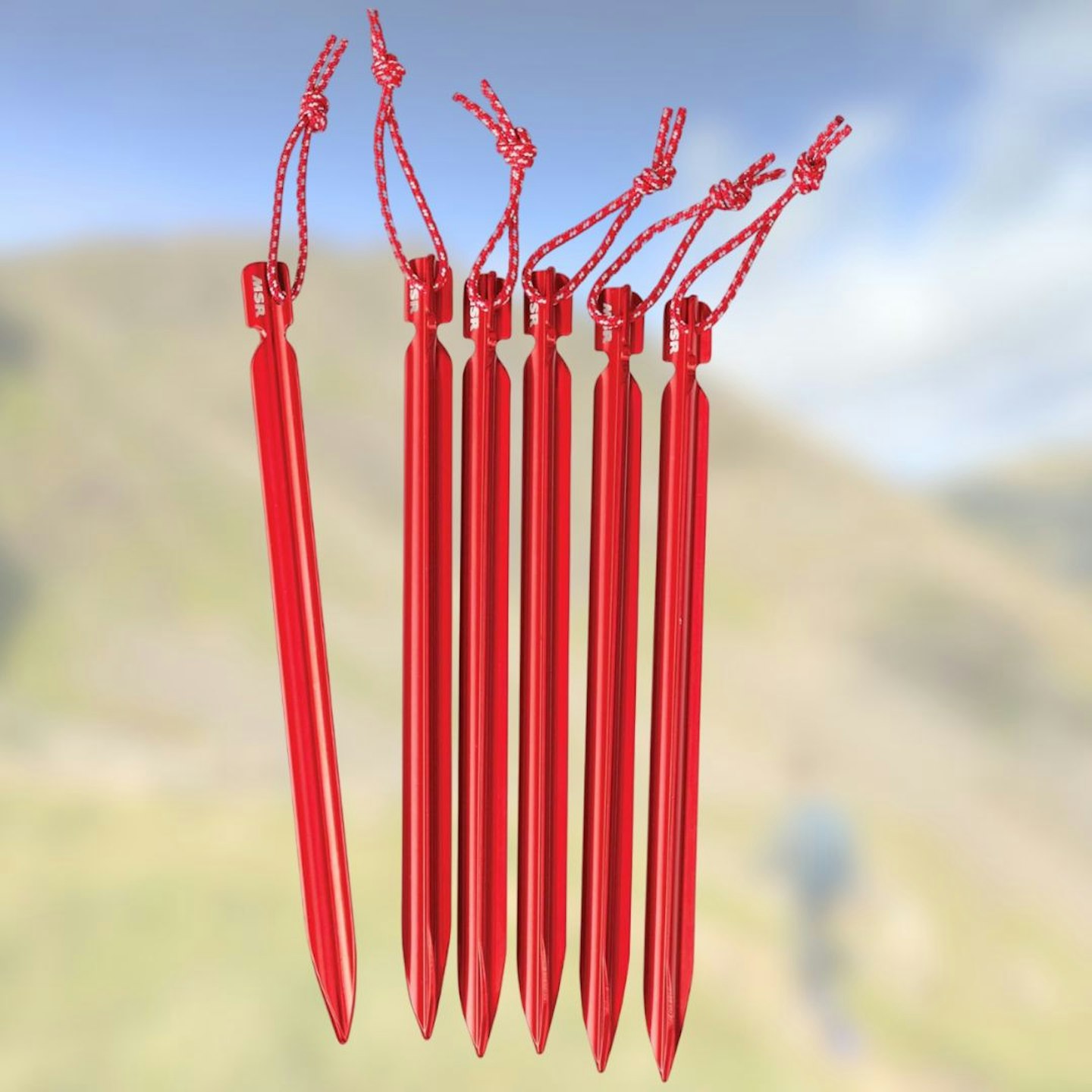
Sometimes supplied tarp pegs get pulled from the ground when the weather conditions get really windy or turbulent, or they will bend out of shape over time. You will not need to worry about your tarp discharging from the ground with these superb tent pegs from MSR. They are made from 7000-series aluminium and are 150mm long with a Y shape for easily piercing ground.
About the author
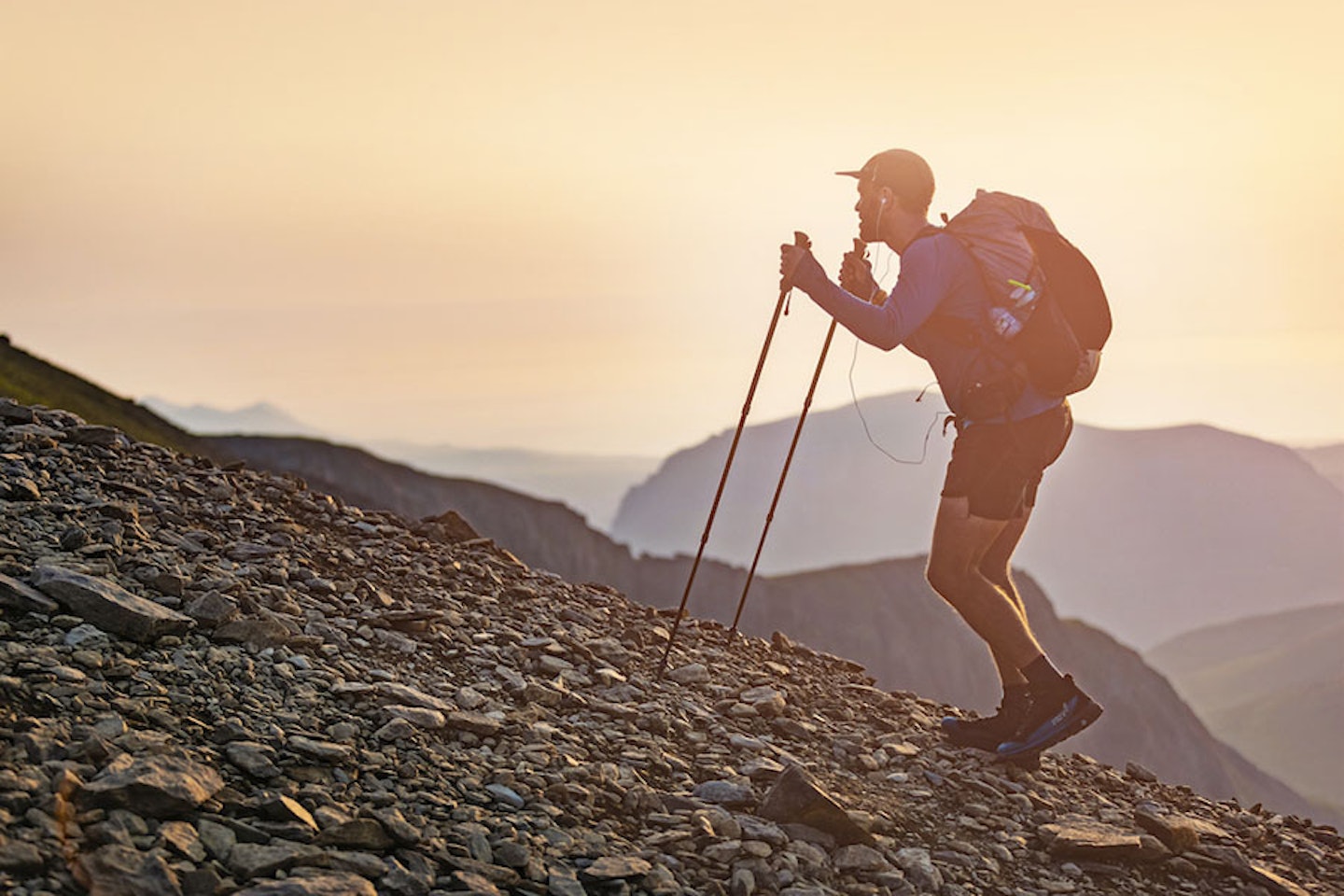
James Forrest is LFTO's lightweight backpacking fanatic. From cold soaked meals (the majority of the LFTO team aren't on board with this) to a halved toothbrush, James goes to great lengths to keep the contents of his rucksack as low as possible, as is therefore a big fan of tarps. James is also an avid trail runner and is based in the Lake District.










